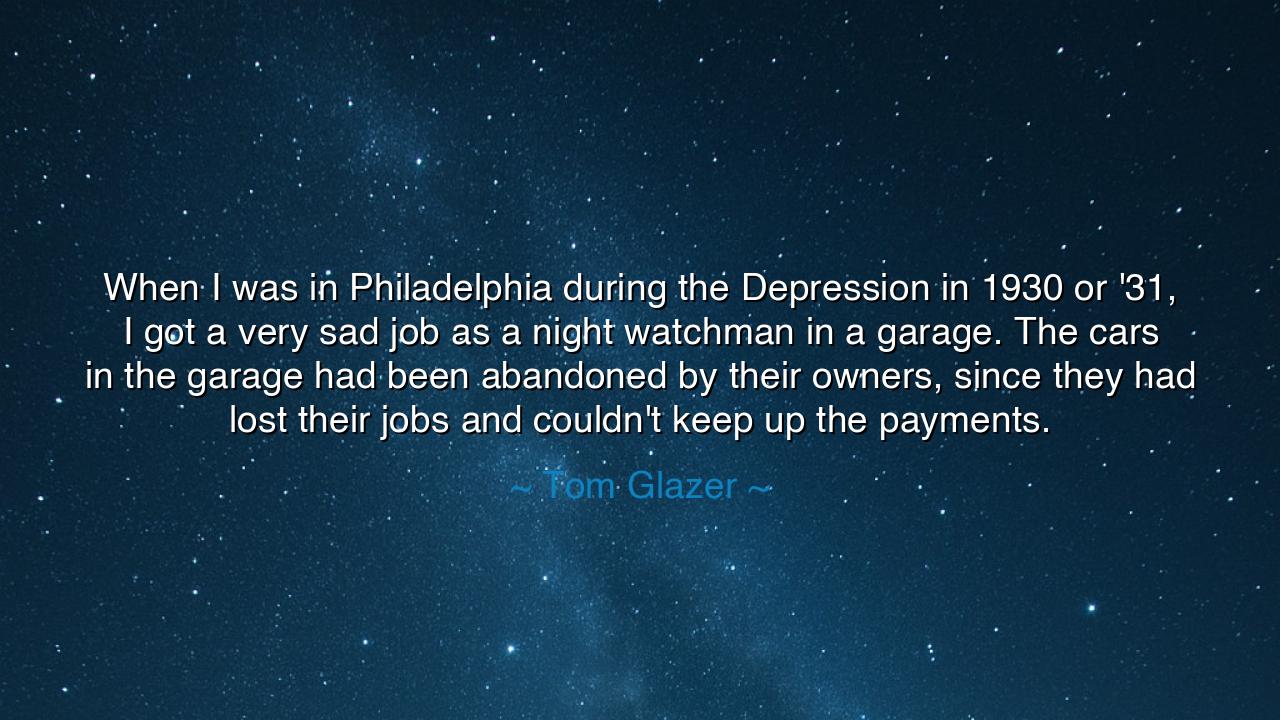
When I was in Philadelphia during the Depression in 1930 or '31
When I was in Philadelphia during the Depression in 1930 or '31, I got a very sad job as a night watchman in a garage. The cars in the garage had been abandoned by their owners, since they had lost their jobs and couldn't keep up the payments.






Hearken, O seekers of wisdom, to the words of Tom Glazer, who cast his gaze upon the desolation of Philadelphia during the Depression of 1930 and '31, a time when the earth itself seemed heavy with sorrow and the souls of men bowed beneath the weight of poverty and loss. In that age of shadows, he took upon himself a sad employment as a night watchman in a garage, a post that bore witness to the fruits of human misfortune. The cars, silent sentinels of wealth once proudly displayed, now lay abandoned, mere echoes of a life that had fled with the jobs of their owners. This was not a place of triumph, but a quiet testament to the fragility of human prosperity, a reflection of how swiftly fortune can vanish like mist at dawn.
In the hollows of that garage, each vehicle was a story—a life interrupted, a family in despair. The men and women who had lost their work, their sustenance, their very hope, had abandoned these symbols of comfort, unable to maintain their payments. And yet, amidst this desolation, Glazer stood vigilant, the solitary custodian of emblems of vanished dreams. Here, the lesson of empathy is written in the dust upon the dashboards: that every object, however lifeless, carries the imprint of human endeavor and human suffering. It reminds us that material wealth is fleeting, and that the essence of life lies not in possessions, but in resilience and compassion.
Consider the story of Dorothea Lange’s photographs, which captured the despair of families during the same Depression, faces etched with hunger and worry. One mother clutched her children, her eyes hollow yet defiant, her gaze pleading not for pity but for remembrance. In her silence, one hears the same echo that reverberated in Glazer’s garage—the inevitable fragility of human security, the capriciousness of fortune, and the need for society to uphold one another when misfortune strikes. Glazer’s watch over abandoned cars is a humble mirror of this broader vigilance: he bears witness to the suffering, a silent participant in the collective human struggle.
Yet within the sadness, there is a heroic element. To endure the sight of abandoned possessions, to walk among the reminders of lost livelihoods, and to remain upright in spirit, is itself an act of courage and dignity. Glazer’s role, seemingly mundane, becomes monumental when seen through the lens of human history, for he preserves the memory of the displaced and neglected, ensuring that society does not forget the injustice of the times. Every night he stood guard, not only over cars, but over the narrative of suffering that they silently narrated.
The meaning of Glazer’s words stretches beyond the walls of that garage and beyond the era of the Great Depression. They speak to us across generations, whispering that wealth and security are ephemeral, that life may strip us of our possessions and status, yet it cannot extinguish the spirit within. The abandoned cars are symbols of loss, yes, but they are also reminders that what truly endures is our capacity for empathy, our commitment to others, and our fortitude in the face of adversity.
Let us take heed of practical action from this tale. Recognize the value of vigilance—not only over material goods but over the wellbeing of our community. Offer support to those whose fortunes have waned, bear witness to struggles that may not touch your own life, and cultivate gratitude for the stability you may enjoy. Like Glazer, find purpose in observing, in protecting, and in remembering, so that the tragedies of the past inform the compassion of the present.
History teaches that times of scarcity are teachers of virtue. In the 1930s, men and women who had lost everything learned humility; their resilience became their inheritance. Today, we must remember that the preservation of human dignity, the care for one another, and the courage to endure are the true currencies of existence. Abandoned cars in a silent garage tell the story: wealth is transient, sorrow is universal, but the human heart’s capacity to endure and to act wisely remains immortal.
Thus, let Glazer’s words resonate in our souls. When you encounter suffering, loss, or desolation, do not avert your gaze. Stand as he stood, watchful and empathetic, finding in sorrow a call to action, a prompt to compassion, and a testament to the enduring strength of the human spirit. The world may leave behind many abandoned things, but it is in our response that meaning is forged, echoing through the corridors of time like the steady beat of a night watchman’s heart.






AAdministratorAdministrator
Welcome, honored guests. Please leave a comment, we will respond soon